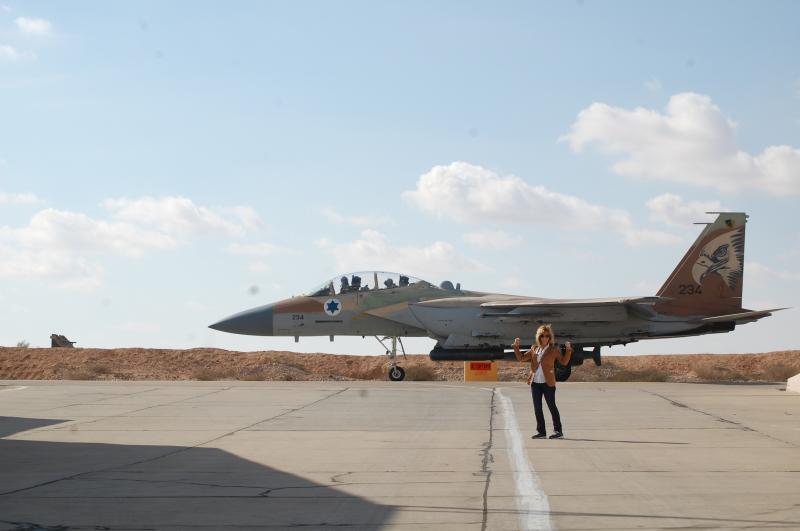The Most Unlikely Startup: IAF
This post originally appeared on Forbes.com.
In 1948, at the Henry Hudson Hotel in New York City, the most unlikely startup was created. It’s founding members dropped everything to fly across the country to Manhattan for secret meetings to launch their endeavor.
Just a year before, one of it’s founding members Leon Frankel was already running a highly successful business buying and selling used cars making $100 to $200 a pop on every sale. Not bad when you consider this is 1947.
But then Leon and a few others got a phone call that would change their lives and put them in one of the harshest environments to build a new organization.
As Leon put it, “I just made up my mind and nothing was going to stop me.”
When you’re building any new venture from scratch, that attitude is critical. When you’re building an air force amidst an ongoing war, that attitude is absolutely required.
Today, the Israeli Air Force ranks second to none globally, according to a study conducted by military experts for Business Insider. “Pilot to pilot, airframe to airframe, the Israeli air force is the best in the world,” said Chris Harmer, a senior naval analyst at the Institute for the Study of War.
In a new documentary called Above and Beyond, which debuted in NYC this past weekend, Nancy Spielberg tells the story of how a few young Americans started what is today considered the world’s leading air force.
Nancy Spielberg with Israeli F-15, Hatzor Air Base, Israel
I was able to sit down with Harold Livingston, another founding pilot who also happened to write the screenplay of Star Trek: The Motion Picture, to ask him a few questions about how this highly unlikely organization was formed.
Dan Reich: I can’t imagine the numerous challenges you confronted, but what was the biggest obstacle you faced when building the Air Force?
Harold Livingston: The United States Government who prevented us from taking the aircrafts out of the country. They enforced an embargo against any aircraft weighing over 25,000 pounds being sent without an export license.
Reich: In the beginning, there wasn’t a blueprint or playbook for what you were doing. How did you train and recruit new members?
Livingston: We played it as it was, with what we had. Recruiting was achieved through word of mouth, airline and/or ex-military friends of friends, various Zionist organizations, even to the point of scanning Air Guard rosters for pilots and crewmen with Jewish-sounding names. Training was another matter: everyone had to be thoroughly checked out by the handful of experienced people (obviously airline and military veterans) available. This was why we were always so woefully short of skilled crewmen, and towards the end forced to hire some dozen (non-Jewish) mercenaries.
Reich: In any new venture, partnerships are very important to achieve success. Were there any partnerships that facilitated the growth of the organization?
Livingston: Czechoslovakia of course was essential, without their assistance and cooperation, we would have been in deep trouble. Same for the Panamanians, although they (Panama) were led to believe we truly were establishing a national Panamanian airline. That “franchise” allowed us to fly the airplanes out of the U.S., and on to Israel.
Reich: In hindsight, what steps would you have taken differently in growing and building the organization?
Livingston: No, not even in hindsight could we and probably would we have done anything different. Under the circumstances, there was nothing we could have done differently. We were, as stated, a “start-up” organization, and therefore learned as we went. And, for sure, from our mistakes.
Harold and Leon’s “nothing was going to stop me” attitude continues to permeate throughout the rest of Israel’s high tech institutions today. With nearly $15 billion in exits through mergers and acquisitions and public offerings, 2014 was an all-time record year for the Israeli hi-tech industry, compared with a mere $1.2 billion raised in 2013, according to a PwC report for 2014. The exits were spread out between a variety of tech industries, including Internet, IT, life sciences, communications and semiconductors.
According to Hillel Fuld, CMO of Zula and startup advisor, “Last week there were $910 million in Israeli tech transactions. In one week!” This past week, the Israeli ecosystem continued to deliver with both VCs and startups raising substantial capital. Some of the financing announced include companies and firms like like Vintage, Singulariteam, ClickTale, Addallom and Kaminario. That amount of capital is highly unlikely for any set of companies, and yet, these businesses and others continue to grow despite the many challenges the region faces.

